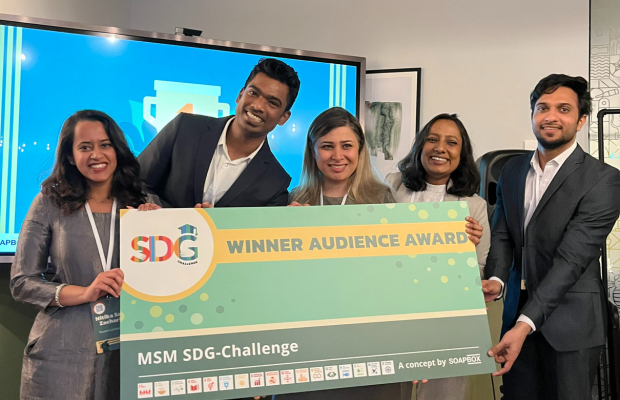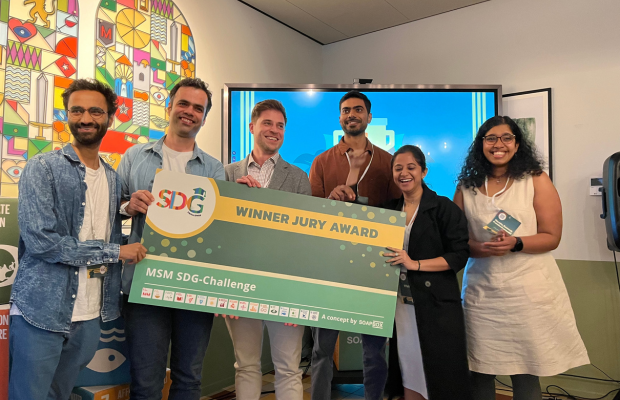MSM SDG-Challenge: a win-win for students and companies
MSM’s full-time MBA and Master in Management students recently engaged in the annual MSM-SDG Challenge. This initiative aims to foster collaboration between students and organisations to work together on the Sustainable Development Goals (SDGs) of the United Nations, which address critical issues like climate change and global inequalities. On Friday 15 March 2024, the student teams pitched their innovative solutions to a panel of judges.
This year MSM was honored to have five leading companies on board providing the students with sustainable business challenges to tackle. The companies joining the 2024 MSM SDG-Challenge were Lemonaid, Maastricht UMC+, Weir, MTB and Paulissen Bakkerij, posing the following to the students:
MTB
How can MTB reach youngsters with a distance to the labour market and with various cultural backgrounds, for their MTB Academy? The academy will offer them tools to reintegrate in society and use their talent.
WEIR Minerals
How can Weir Minerals create local impact and engage the community in doing so?
MUMC+
What are the three current trends on food waste management among the suppliers of MUMC+? Compare these trends with other competitors in the market and translate this into a cost-benefit analysis.
Bakkerij Paulissen
Create a cost/benefit/impact analysis of zero emission delivery by Bakkerij Paulissen in the centre of Maastricht (Low Emission Zone). How can Bakkerij Paulissen inspire fellow Maastricht entrepreneurs (and clients) to follow their lead?
LemonAid
In which way does LemonAid differentiate itself, based on three varying sustainable parameters, from its competitors in the Dutch market? Find a way to translate this into a marketing strategy and test its feasibility.
To get to know the company and the challenge it is facing, the student teams met with their specific company during the so-called Sprint Day. Harsha Ramesh, Master in Management student and the team worked on the SDG-challenge of MTB. “The Sprint Day was a really interesting experience. We got to know MTB, their work and got to experience their infrastructure. It was also a challenging day as we as a team had to come up with ideas and directions within a span of a few hours and present it. The most intriguing part was that we got to experience the company from a third-person perspective and prepare ourselves for the SDG challenge ahead.
Team MBT approached the problem in sub-teams but collaborated through the entire process to end up with three solutions. The solutions were a learning app (mtbit.) which would induce hybrid learning as well as employee well-being, brand image adaptation, and updating of the MTB academy curriculum. Harsha adds that the team took a lot of time to delve into the problem. “MTB was very supportive and eager to implement our solutions within their academy.”
Following the very positive experience they had the first time, MTB joined the MSM SDG-challenge for the second time this year. In addition, MTB had a current problem, which was very suitable for the team of international students with different cultural backgrounds. “As always, working with students gives us new insights because they approach the problem in a different way. We are very open to receive different opinions and ideas from people who look at our company and what we do from the outside in. The solutions presented by the students were very well received. Just like the previous challenge, we decided to implement the outcome. In this case the concept of the app and a separate online environment for the MTB Academy. We are still looking in which way we can involve some students in this implementation.”
Kinjal Jain, Full-time MBA student, summarises that for her and her team the Sprint Day acted as a guiding force to create a marketing strategy for LemonAid. “It provided the much-needed structure to the multitude of information we had collected via the website. The team understood each other’s ideas and this got the ball rolling in terms of collaboration, which came easily subsequent to the Sprint Days. Moreover, since the solution we were working towards was critical for LemonAid to enter the Dutch market, the Sprint Day also allowed the company representatives to mull over our ideas, provide constructive feedback and support us with the necessary information.”
Team Lemonaid also divided the team into sub-teams. One team conducted a competitor analysis and another team coordinated and arranged the market research. The third team conducted an analysis of the websites and social media accounts to provide detailed feedback on the way forward. “This together culminated into a robust marketing strategy for LemonAid, a document that we believe is useful and usable by Lemonaid,” concludes Kinjal.
Kinjal shares that the team values how extremely supportive the LemonAid team has been throughout the project. “We shared regular updates with them which allowed them time to give us feedback. This translated into the marketing strategy aligning with the needs of the company. They even supported us during the market research days by being present in person and guiding us. Most encouraging of all, Lemonaid cheered us on during the final, shared encouraging words and even celebrated with us.”
Kinjal appreciated the importance of the teamwork and collaboration between her team members. From the project point of view, the key learning outcome involved the fact that 45% of the participants in the survey were not aware of the story of Lemonaid. This served as a guiding principle in determining the strategy and solutions for Lemonaid. “Through this challenge, our team got hands-on experience in the implementation of SDG goals within a company. The major learning outcome for me was how within a short time, a diverse group of students could come up with very practical solutions. Furthermore as a team lead I learnt that keeping expectations very clear within both parties really helped in coming up with practical solutions.”
Harsha also indicates that the key learning outcome for her team was the significance of collaboration between the Master in Management and full-time MBA students, effective communication and the brainstorming aspect within a professional setting. “We, as a fully international team, worked hard and managed to pull off a good job through a huge learning curve. The MSM SDG Challenge helped me to apply the marketing tools that we were taught in class. It improved my collaboration skills by working with classmates from various backgrounds with diverse viewpoints. It also helped me to push myself to be solution oriented, as in the end we wanted to deliver a marketing strategy that can be applied by LemonAid.”
The student team collaborating with MTB was announced as the winner by the jury, while the student team working with Lemonaid was announced as the winner by the audience. All companies really valued the solutions that the student teams provided for the sustainable business challenges and are looking forward to implementing them.

Weir Minerals has been participating in the MSM SDG-Challenge for a few years in a row. They consider the MSM SDG-challenge a big opportunity to work on their sustainable goals together with students. “Working with students of MSM encourages innovation, as the students come up with very clever, practical and innovative ideas. In addition, the MSM SDG-challenge is a great way to build relationships with various stakeholders like students, other companies, and MSM. It also helps us to stay in contact with talented students, who potentially are our future workers.
We really enjoyed the in-house Sprint Day, which started with the enthusiastic group of students and ended with some really good ideas for the challenge we defined. Of course, the final in Maastricht was also a highlight. However, in the end the biggest highlight was the cooperation with the students and the created ideas which will help us to continue our journey to a more sustainable world.
The advised solutions can help us to engage with the local community in a practical manner. On the one hand, this allows us to contribute to that community; on the other hand, the solutions also allow us to engage with and enthuse the local community about who we are as a company and attract potential future workforce. This is a win-win situation.”
Click here to watch the offical MSM-SDG Challenge 2024 finale aftermovie.
Related news
SBE maintains outstanding position in CEO Magazine's Global MBA Rankings
In the classroom: A student’s perspective on the full-time MBA courses in 2024
A sneak peek in the life of full-time MBA alumnus Carlos Dominguez
In the classroom: A student’s perspective on the Master in Management courses in 2024
Personal Development Portfolio: Maximising your future workplace success

